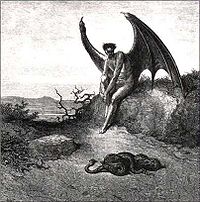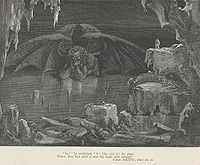Difference between revisions of "Satan"
(→History) |
(Adding an Apocrypha section) |
||
| (23 intermediate revisions by 4 users not shown) | |||
| Line 1: | Line 1: | ||
| − | [[Image:MiltonSatan.jpg|thumb|200px|Satan as depicted by John Milton.]] | + | [[Image:MiltonSatan.jpg|thumb|200px|Satan as depicted by Gustave Doré, illustrating John Milton's ''Paradise Lost''.]] |
| − | [[Image:DanteSatan.jpg|thumb|200px|Satan as depicted | + | [[Image:DanteSatan.jpg|thumb|200px|Satan as depicted by Gustave Doré, illustrating Dante's ''Inferno''.]] |
[[Image:Satan.jpg|thumb|200px|Satan as [[Egon Pax|depicted]] by some ''[[Gargoyles (TV series)|Gargoyles]]'' fans.]] | [[Image:Satan.jpg|thumb|200px|Satan as [[Egon Pax|depicted]] by some ''[[Gargoyles (TV series)|Gargoyles]]'' fans.]] | ||
| − | '''Satan''' is the Prince of Darkness in | + | '''Satan''' is the Prince of Darkness in Abrahamic tradition. |
| + | |||
| + | Satan and [[God]] don't see eye-to-eye on much. | ||
==History== | ==History== | ||
| − | In 971, [[Alesand]] described the [[Peredur fab Ragnal|Player King]] as having the kind eyes of a Saint and the smile of the | + | In [[Timeline#971-993|971]], [[Alesand]] described the [[Peredur fab Ragnal|Player King]] as having the kind eyes of a Saint and the smile of the Devil himself. ''([[The Reach|"The Reach"]])'' |
| − | In 997, [[Constantine III|Constantine]] falsely claimed that [[Finella]] had "turned to sin and Satan" to murder [[Kenneth II]]. ''([[The Gate|"The Gate"]])'' | + | In [[Timeline#995-1993|997]], [[Constantine III|Constantine]] falsely claimed that [[Finella]] had "turned to sin and Satan" to murder [[Kenneth II]]. ''([[The Gate|"The Gate"]])'' |
When [[Elisa Maza]] tried to persuade her brother [[Talon|Derek]] not to accept a job offer from [[David Xanatos]], Derek replied, "No doubt you've got some snitch who'll tell me Xanatos is the Prince of Darkness." To which Elisa replied, "He practically is!" ''([[Her Brother's Keeper|"Her Brother's Keeper"]])'' | When [[Elisa Maza]] tried to persuade her brother [[Talon|Derek]] not to accept a job offer from [[David Xanatos]], Derek replied, "No doubt you've got some snitch who'll tell me Xanatos is the Prince of Darkness." To which Elisa replied, "He practically is!" ''([[Her Brother's Keeper|"Her Brother's Keeper"]])'' | ||
| + | |||
| + | ==Apocrypha== | ||
| + | ===''[[Gargoyles_Meets_the_Fantastic_Four|Gargoyles Meets the Fantastic Four]]''=== | ||
| + | Satan may or may not be the alter ego and/or master and/or rival of [[Mephisto]]. ''([[Both Alike In Dignity...|"Both Alike In Dignity..."]])'' | ||
==Real World Background== | ==Real World Background== | ||
| − | In Hebrew lore, Satan was originally depicted, not as a fallen angel in rebellion against God, but as a kind of prosecuting attorney in Heaven, who accused [[human]]s of the sins they had committed ("Satan" means "Adversary" in Hebrew | + | In Hebrew lore, Satan was originally depicted, not as a fallen angel in rebellion against God, but as a kind of prosecuting attorney in Heaven, who accused [[human]]s of the sins they had committed ("Satan" means "Adversary" in Hebrew – and here, in the sense of an opponent in court). He appears in that role in the first two chapters of the Book of Job, where he cynically suggests that the only reason why Job led such a righteous life was because of the blessings God had conferred upon him, and that he would stop praising God if those blessings were withdrawn. After the Babylonian Captivity, however, the more familiar notion of Satan as a rebel cast out from God developed, perhaps influenced by the war between Ahura Mazda (or Ormadz), the god of good and light, and Angra Mainyu (or Ahriman), the god of evil and darkness, in Zoroastrianism. Satan appears in that role in the New Testament, such as his unsuccessful temptations of [[Jesus]] (Matthew 4: 1-11 and Luke 4:1-13) and his battle with the archangel Michael in Revelation (12: 7-9). |
| + | |||
| + | In Islamic tradition, Shaitan is the name not of an individual, but of an entire class of evil spirits who constantly tempt humans and jinn alike to sin. The most prominent Shaitan is Iblis who, according the the Qur'an, was cast out of heaven for refusing to prostrate himself before Adam at God's command. Islamic sources are divided as to Iblis' original pre-fallen nature. One tradition holds that he was originally an angel (like his Christian counterpart). Another claims that he was the first jinn, just as Adam was the first human. | ||
| + | |||
| + | In the final canto of his ''Inferno'', the Italian poet Dante Alighieri (1265-1321) portrayed Satan as trapped up to his waist in the ice that fills the lowest circle of [[Hell]], a gigantic figure with three sets of wings (constantly rotating like fans, thereby keeping the ice that traps him frozen) and three faces; his three mouths forever gnaw at the three greatest traitors in history, Judas Iscariot (who betrayed Jesus), and Brutus and Cassius (who betrayed Julius Caesar). In German legend, [[Faust]] makes a pact with Satan's servant, Mephistopheles. John Milton (1608-1674) made Satan a major character in his epic poem ''Paradise Lost'', which recounted how Satan rebelled against God, was defeated, driven out of Heaven, and hurled into Hell, and how he tempted Adam and Eve in revenge. | ||
| + | |||
| + | ==Production Background== | ||
| + | [[Image:David_Xanatos_Main_Image.PNG|thumb|200px|[[Elisa Maza|Elisa]] thinks he practically is Satan. Standards & Practices thought a more direct reference to him would be mistaken as the devil himself. Easy to think so.]] | ||
| + | Originally [[Demona|Demona's]] line of reference in [[The Mirror|"The Mirror"]] to the [[David Xanatos|one]] [[Puck]] serves was written as: "You serve him, now you can serve me." The line was altered to change "him" to "the human" due to an S&P executive's concern that "him" would be mistaken for Satan. [http://www.s8.org/gargoyles/askgreg/search.php?rid=111] [[Greg Weisman]] wrote how he might do a story about Lucifer and the [[angel]]s someday, provided he can do so in an S&P approved way. [https://www.s8.org/gargoyles/askgreg/search.php?qid=4803] | ||
| + | <br style="clear:both;"/> | ||
| + | |||
| + | ==See Also== | ||
| + | {| align=right style="border:1px solid #ffffff; border-collapse: collapse;" | ||
| + | |style="border-right:1px solid #ffffff;" | [[Image:DevilsAdvocateSatan.jpg|200px]] | ||
| + | |style="border-right:1px solid #ffffff;" | [[Image:SouthParkSatan.png|200px]] | ||
| + | |- align=right style="border:1px solid #ffffff; border-collapse: collapse;" | ||
| + | |style="border-right:1px solid #ffffff;" | [[Image:FuturamaRobotDevil.jpg|200px]] | ||
| + | |style="border-right:1px solid #ffffff;" | [[Image:VertigoLucifer.jpg|200px]] | ||
| + | |- align=right style="border:1px solid #ffffff" | ||
| + | |Various Pop-culture interpretations. | ||
| + | |} | ||
| − | + | *{{wikipedia|Satan}} | |
| − | + | [[Category:Canon characters]] | |
| − | + | [[Category:Real world characters]] | |
[[Category:Canon characters]] | [[Category:Canon characters]] | ||
[[Category:Real world characters]] | [[Category:Real world characters]] | ||
Latest revision as of 02:42, 16 October 2025
Satan is the Prince of Darkness in Abrahamic tradition.
Satan and God don't see eye-to-eye on much.
Contents
History
In 971, Alesand described the Player King as having the kind eyes of a Saint and the smile of the Devil himself. ("The Reach")
In 997, Constantine falsely claimed that Finella had "turned to sin and Satan" to murder Kenneth II. ("The Gate")
When Elisa Maza tried to persuade her brother Derek not to accept a job offer from David Xanatos, Derek replied, "No doubt you've got some snitch who'll tell me Xanatos is the Prince of Darkness." To which Elisa replied, "He practically is!" ("Her Brother's Keeper")
Apocrypha
Gargoyles Meets the Fantastic Four
Satan may or may not be the alter ego and/or master and/or rival of Mephisto. ("Both Alike In Dignity...")
Real World Background
In Hebrew lore, Satan was originally depicted, not as a fallen angel in rebellion against God, but as a kind of prosecuting attorney in Heaven, who accused humans of the sins they had committed ("Satan" means "Adversary" in Hebrew – and here, in the sense of an opponent in court). He appears in that role in the first two chapters of the Book of Job, where he cynically suggests that the only reason why Job led such a righteous life was because of the blessings God had conferred upon him, and that he would stop praising God if those blessings were withdrawn. After the Babylonian Captivity, however, the more familiar notion of Satan as a rebel cast out from God developed, perhaps influenced by the war between Ahura Mazda (or Ormadz), the god of good and light, and Angra Mainyu (or Ahriman), the god of evil and darkness, in Zoroastrianism. Satan appears in that role in the New Testament, such as his unsuccessful temptations of Jesus (Matthew 4: 1-11 and Luke 4:1-13) and his battle with the archangel Michael in Revelation (12: 7-9).
In Islamic tradition, Shaitan is the name not of an individual, but of an entire class of evil spirits who constantly tempt humans and jinn alike to sin. The most prominent Shaitan is Iblis who, according the the Qur'an, was cast out of heaven for refusing to prostrate himself before Adam at God's command. Islamic sources are divided as to Iblis' original pre-fallen nature. One tradition holds that he was originally an angel (like his Christian counterpart). Another claims that he was the first jinn, just as Adam was the first human.
In the final canto of his Inferno, the Italian poet Dante Alighieri (1265-1321) portrayed Satan as trapped up to his waist in the ice that fills the lowest circle of Hell, a gigantic figure with three sets of wings (constantly rotating like fans, thereby keeping the ice that traps him frozen) and three faces; his three mouths forever gnaw at the three greatest traitors in history, Judas Iscariot (who betrayed Jesus), and Brutus and Cassius (who betrayed Julius Caesar). In German legend, Faust makes a pact with Satan's servant, Mephistopheles. John Milton (1608-1674) made Satan a major character in his epic poem Paradise Lost, which recounted how Satan rebelled against God, was defeated, driven out of Heaven, and hurled into Hell, and how he tempted Adam and Eve in revenge.
Production Background

Originally Demona's line of reference in "The Mirror" to the one Puck serves was written as: "You serve him, now you can serve me." The line was altered to change "him" to "the human" due to an S&P executive's concern that "him" would be mistaken for Satan. [1] Greg Weisman wrote how he might do a story about Lucifer and the angels someday, provided he can do so in an S&P approved way. [2]
See Also

|

|

|

|
| Various Pop-culture interpretations. |
- Satan at Wikipedia, the Free Encyclopedia


